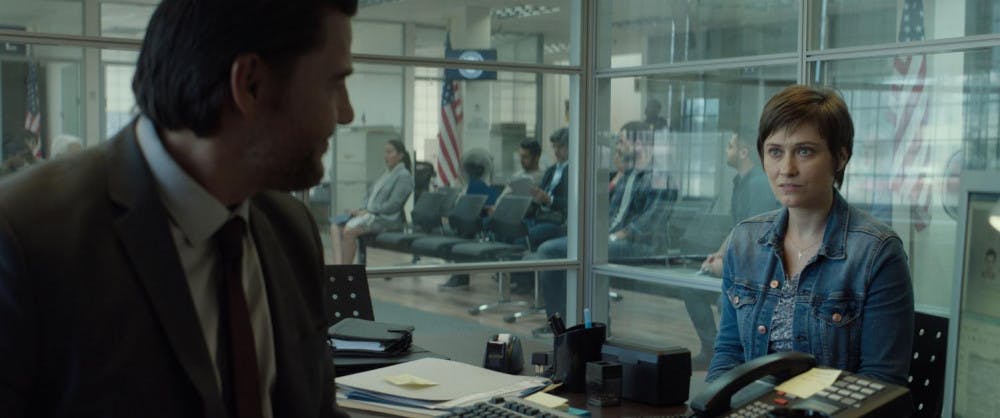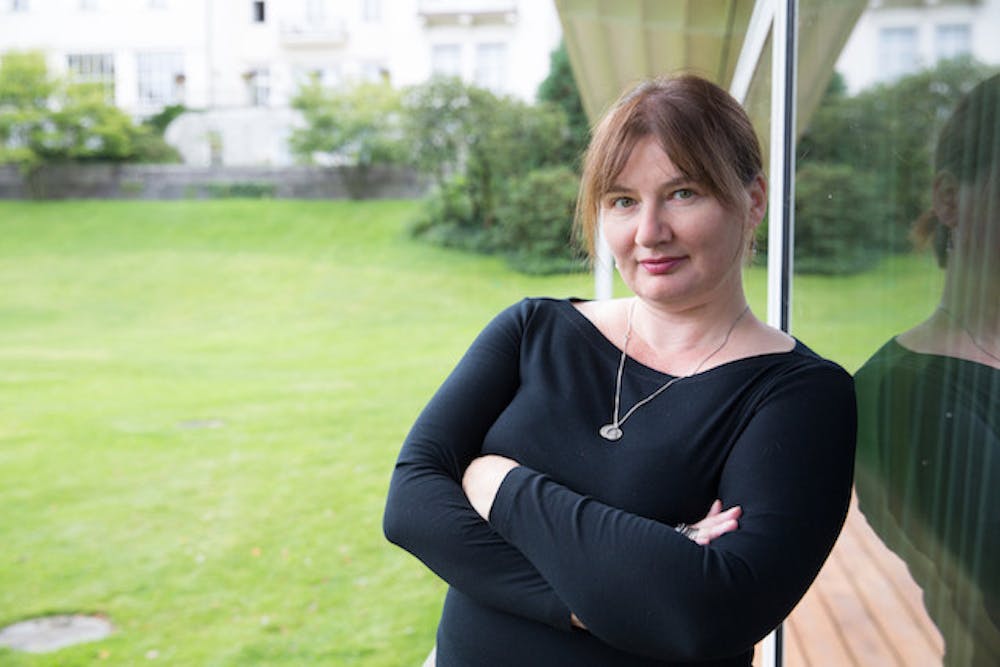“A little irresponsible” is how Film and Media Culture Professor Ioana Uricaru describes her decision to move to the U.S. in 2001 to study film and television production at the University of Southern California. She did not have any friends or family in the U.S., and naively she thought the university would provide housing for her. Moreover, she did not have the money to pay for the expensive program.
Luckily, she found a room to rent online while she was still in Romania, her home country. She became friends with the landlady Tracey, who picked her up at the airport three days before school started, and stayed with her for a couple of years.
During her first year in Los Angeles, Uricaru sometimes found herself in a far from ideal situation. At some point, Tracey told her that she had to make lemonade, because “when life gives you lemons, make lemonade.”
That is where the name of Uricaru’s debut feature film comes from. “Lemonade” centers on Mara, a 30 year-old Romanian immigrant and single mother working on a temporary visa in the U.S. who marries an American man. When she applies for a green card, things start to become difficult, and she is forced to confront various obstacles.

“I wanted to make a film about a Romanian woman who immigrates to America, because that’s what I know,” Uricaru said. “That’s what I lived through.”
When she heard the overly-optimistic American expression that seems to suggest any trouble can be turned into something positive, she was puzzled and found it “really stupid and almost offensive.”
Later, she started to realize that the idea behind the saying is one deeply rooted in American culture — the belief that one can always find a way around hardships as long as one makes the effort. Yet that may not be totally aligned with reality, as the challenges faced by Mara in the film show.
Uricaru’s own story as a filmmaker and an immigrant perhaps can be seen as one of making lemonade out of lemons. Her father is a writer, her mother teaches Romanian, and Uricaru grew up in Cluj, a city in Transylvania, in a house full of books and a love of literature and fiction. At the same time, she grew up under the Communist dictatorship of Nicolae Ceaușescu. Control over media is just one of the many repressive aspects of the totalitarian regime, and going to the cinema to watch movies became one of the very few things that Uricaru enjoyed and needed in order “to escape the bleakness of everyday life.”
The reality of the dictatorship also influenced Uricaru’s choice in what to study in university, and she considered the range of options to be very narrow.
“A lot of possibilities were just out of the question, because many of the humanities were not just ideologically influenced, but [also] ideologically controlled,” she said. “You couldn’t do literature, or history, or philosophy — anything like that — and have a good feeling about it.”
The sciences were what remained. For young Uricaru, going to a large city after university to work was also important. A degree in science and a potentially high-level research job in laboratories seemed to be the way to achieve success in Communist Romania, where the government would assign graduates their jobs.
Uricaru graduated from University of Bucharest in the Romanian capital with a Masters of Science in Biochemistry. The degree, however, did not land her a job in a lab. When she was still a student at the university, violent demonstrations against the totalitarian regime led to the overthrow of the government and the execution of Ceaușescu, ending the 42 years of Communist rule of Romania. What followed was a painful transition to capitalism and democracy.
“Although I was a student in biochemistry, I felt that this is the last chance that I have to maybe do something else,” she said. “So I started thinking about it, and I realized that I still wanted to do film.”
The only film school in Romania, National University of Theatre and Film, was harder to get in than one might imagine. The school would only accept about seven students each year for the directing track, and there was a rumor that only those with private ties could get in.
Despite not knowing anything about film production, Uricaru believed it was the last chance that she had to pursue her passion. She took the admissions test twice, first when she was still in her fourth year of the biochemistry program, then when she had finished her science degree.
She compared the test to the kind of reality television show in which people try to survive on an island. It was probably a little less dramatic, but there were multiple rounds of stressful competition over the course of one week that eliminated the number of applicants from 120 to seven.
“I thought … if I don’t get in the second time, then forget it, I’m just going to become a scientist,” she said. “But I did get in the second time.”
The offer was not something she could turn away, and she started her journey toward becoming a filmmaker. Later, she continued her studies at USC and paid for the tuition herself through — unexpectedly but perhaps not surprisingly — a teaching assistantship in the university’s biology department.
“So in the end, it was good that I did the degree in biology. It was useful,” she said, laughing.
It was also useful in the sense that filmmaking is as much a process of artistic creation as analytic, scientific organization. Uricaru possessed skills and experiences for both, and the duality of their combination resonates with both “Lemonade” and her identity.
“Lemonade” is a Romanian film and is mainly produced by a Romanian company, while it is also set in the U.S. and focuses on this country of immigrants, making it somewhat similar to an American indie film.
“I’m now a permanent resident, so I’m kind of an American now too. And if I ever get an American citizenship, I will keep my Romanian citizenship,” Uricaru said. “So I’m going to always be both. I like the film to also be both.”
The film depicts the struggle of balancing two identities as an immigrant in the U.S., and the events in it all came from real-life stories that Uricaru gathered through extensive interviews with young Romanian immigrants with children. They told her different stories, but all of them expressed a similar sense of “ambivalence between what they left behind and the new country.” Uricaru found that they somehow saw themselves as “the sacrificial generation,” and that they were doing everything for their children, who were either born in the U.S. or came here early on.
The immigrants she interviewed had some discoveries of their own, too. When she told them that she was looking for a little boy about eight or nine years old, who speaks Romanian to play Mara’s son character in the film, they all responded that their children could speak Romanian, which turned out to not be the case when she met the children.
“The parents lived in this kind of illusion almost, because they spoke Romanian around the house, [and] the child seemed to understand, but actually the child didn’t speak it,” Uricaru explained, adding that many parents had since told her they started to try encouraging their kids to speak the language more.
Uricaru was interested in this feeling of not fully belonging in either place and the constant self-questioning of whether the decision to emigrate was a good one. As for herself, she found it difficult to tell if that is something she still wonders about. What was more important was that she make a “very conscious effort” to spend time in Romania and do work there so that she stays in touch.
If the style of her film can be an indicator of whether or not she has stayed in touch, it seems that Uricaru has. According to media production specialist Ethan Murphy, “Lemonade” is “very much in the style of new wave Romanian [cinema].” One of the film’s producers is Cristian Mungiu, an established Romanian filmmaker whose achievements include a Golden Palm at the Cannes Film Festival.
Mungiu is among a group of new Romanian filmmakers who have been exceptionally well-received in the last 15 years.
To show me the Romanian films she considers to be masterpieces during our interview, Uricaru stood up from her office chair and reached for a few DVDs, including “The Death of Mr. Lazarescu” (2005) and Mungiu’s “4 Months, 3 Weeks and 2 Days” (2007). The films have come to represent what people call “Romanian minimalism” — the idea that the individual story and detail of everyday life are emphasized, as opposed to the focus on the national and the collective under the Communist regime.
“It’s really a contagion,” she said, referring to the filmmakers who continue to produce excellent films. “So I’m very proud to be a Romanian filmmaker at this time, I think it’s great.”
In the one-hour talk with Uricaru in her office in Axinn, the fact that she is a professor dedicating a lot of of her time teaching two classes in one semester almost faded into the background.
Finne Murphy ’19 is an English major taking Uricaru’s screenwriting class, and she appreciates how hard she pushes students to make their screenplays even better. Murphy, not unlike Uricaru, grew up with a writer father.
“[My father] has a MFA in screenwriting, so my whole life he has been writing scripts. I grew up learning it, but I’ve always wanted to write fiction,” Murphy said. “But since being in this class, I kind of wish I was a Film and English double major, or that I had started this sooner.”
This is now Uricaru’s seventh year at Middlebury — producing “Lemonade” took eight. She shot the film in Canada during her year on sabbatical and completed the post-production while teaching, flying to Europe during one semester, Thanksgiving and winter breaks.
After its Canadian premiere in Montreal (where it was also shot) this week and before its Romanian premiere next week, “Lemonade” will reach Middlebury audiences as well. The film will be screened this Saturday as part of the Hirschfield International Film Series. Uricaru and Mălina Manovici, who plays the film’s protagonist, will be in attendance for discussion after each screening. The film will also be shown in Burlington on Oct. 18 at the Vermont International Film Festival.
Editor’s note: Finne Murphy is an Arts & Academics editor.
Professor's Debut Film Screened Worldwide

COURTESY PHOTO
Profesor Uricaru is in her 7th year teaching Film and Media Studies in Middlebury College.
Profesor Uricaru is in her 7th year teaching Film and Media Studies in Middlebury College.
Malina Manovici plays Mara, a Romanian single mother, in Uricaru's debut feature, "Lemonade."
Comments



